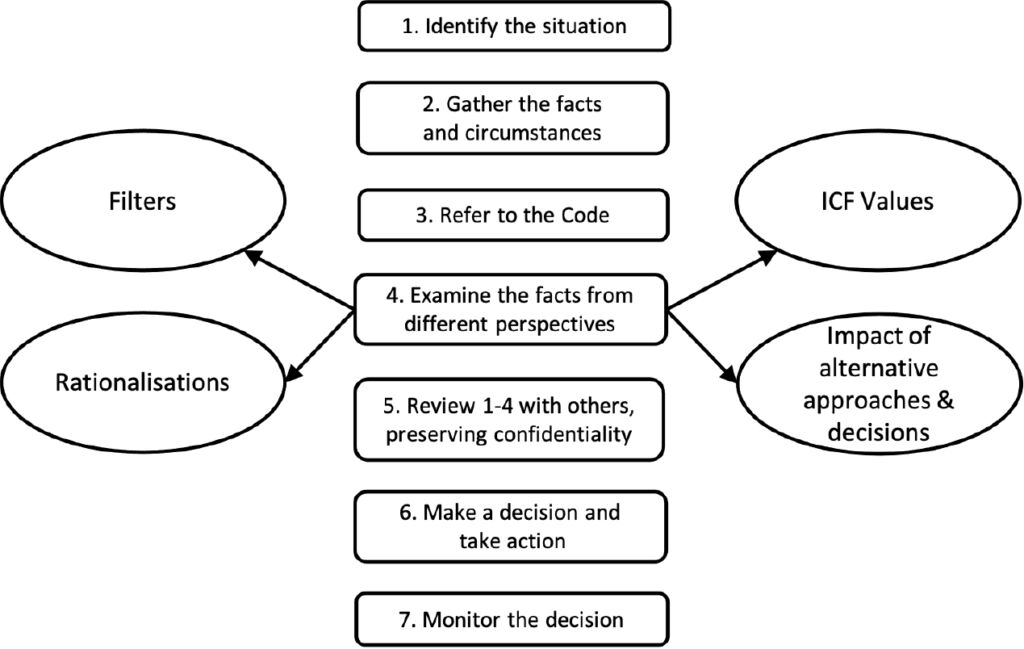Back in February 2020, I wrote about the ‘new’ ICF Code of Ethics and the changes that were made to the code, which were quite substantial. Over the years I have delivered many classes on ethics, and they alway include how we make ethical decisions. Here, I’ll offer thinking around:
- Where do our ethics typically come from?
- What influences how we make ethical decisions?
- What are the ways we typically make ethical decisions?
- Why do we need an ethical decision-making process to support us as coaches?
In discussing the above, I will offer a tool or a model that can be used to help us make the best possible decision that we can, given the facts and circumstances.
Where do our ethical roots come from?
For many of us, our initial ethical roots will come from those people and places that influence us as we grow up. Our family, our community, our culture, our religion are all part of the fabric of our lives that start influencing our ethical platform and indeed our moral codes.
As we grow and develop, the education we receive, our social groups, our life experiences, our gender, and our sexuality, amongst many other things, will also influence our thinking. As I get older, I certainly notice my thinking around ethical codes of conduct can change and I observe that sometimes my thinking is different from that of other generations for example. None of which necessarily makes our own thinking right or wrong. It’s just maybe different. Although we start with basic roots, as we develop and grow, we change, society changes and our thinking changes.
All these things mean that for us as coaches it is useful to have a set of guidelines that help us make decisions based on our profession. In fact, many professional services, also have standard codes of conduct and ethics which people are asked to abide by.
However even with a set of standards, is it easy to make ethical decision? They are after all guidelines and not a set of ‘do’s and don’ts’. Which means there will often be ambiguity.
What decision-making tools do we have already? Are they enough and are there downsides to those tools?
Here are some typical tools, models or filters we may use to come up with a decision:
- It’s my/their basic human right.
- It’s for the common good.
- It’s my duty – especially if we belong in a military or government environment.
- It’s only fair.
- The consequences of doing or not doing something.
In looking at each of those different ways of thinking, or lenses, what is noticeable is that my fundamental roots mean I have preferences. I view the world from a certain position and that may not be the only way of looking at something.
Having looked at an ethical dilemma through one or some of those lenses we may end up rationalising our decisions to make it fit our answer. Common examples of this could be:
- It’s legal, therefore its ethical – just because an expense policy doesn’t specifically mention something you can’t expense, does that means it’s ok to do it?
- It’s ethical because it’s for a good cause – will everyone believe it’s a good cause just because I do?
- It’s the way business is done around here – does it make it right or wrong, does it fit your values?
- No-one is getting hurt – does it make it right or wrong?
We then come to the issue of if there is ever a right or wrong answer. Often in ethical dilemmas, there may not be a definitive, binary answer and it might depend upon many elements of the situation.
So, what might it depend upon?
- Circumstances
- Actual known facts
- Rules that exist
- Your values
- Their values
- Your organisation’s values and principals
- Your thinking
- Consequences and impacts
- What else?
The list, which really starts to capture our filters, could continue, which is why a more universal model might help us come to the best answer that is possible at any given time.
In 2006, an ICF Committee created an ethical decision-making model, that goes a long way to supporting coaches to make the best possible decision. A coach and member of that committee, Liora Rosen put the model together. It’s simple, in depth and can be very effective.
ICF Ethical Decision-Making Model

The model requires us to go through steps 1-4 ourselves and look at all the factors that can help us and explore all the aspects that might influence our thinking with respect to a decision.
What we then need to do is discuss it with a confidential other. Be that a colleague or a supervisor. Ask them to go through the same steps 1-4 but without our input or influence. We may in some circumstances seek yet another person’s input.
Having done that we can then decide, not just based on our thinking but that of others too and take the appropriate actions. What then becomes important is that you monitor and review that decision and ask questions such as:
- What was the outcome in the end?
- Given the outcome would you have done anything differently?
- What has the experience added to your understanding of ethics?
- What would you add into your thinking next time you have a dilemma?
Each time we go through this process we will be adding to and enriching our own understanding of ethics and enhancing our own ethical decision-making process.
Although this is a model created by coaches for coaches, it is still relevant in many other situations. I hope, having read this blog, you will be encouraged to give it a try, next time you face an ethical dilemma. There are also a number of books now on ethics and a number of communities that discuss ethics in depth. If this has whetted your appetite, I would encourage you to explore further!
Further resources to explore
- ICF has a Community of Practice around ethics.
- ICF has many resources on ethics.
- The Coaching Ethics Forum has an annual conference.
- Books:
- Ethicability (Professor Roger Steare)
- Values and Ethics in Coaching (Ioanna Iordanou)
- The Ethical Coaches’ Handbook (Wendy-Ann Smith)

Hilary Oliver is a Master Certified Coach (MCC) with the International Coaching Federation (ICF). She is also a trained Coaching Supervisor and Mentor Coach. Hilary trains coaches and works with managers and leaders to develop their coaching capability. She works as an International Corporate Executive and Board Level Coach, a leadership development designer and facilitator working with a wide range of organisations. Hilary also specialises in working with organisations to support them develop coaching culture. She has been the President of the UK ICF Chapter and is a Past Chair of the ICF Global Board.
Share This Post!
Sign up for additional resources, opportunities and updates!
Delivered straight to your inbox.







